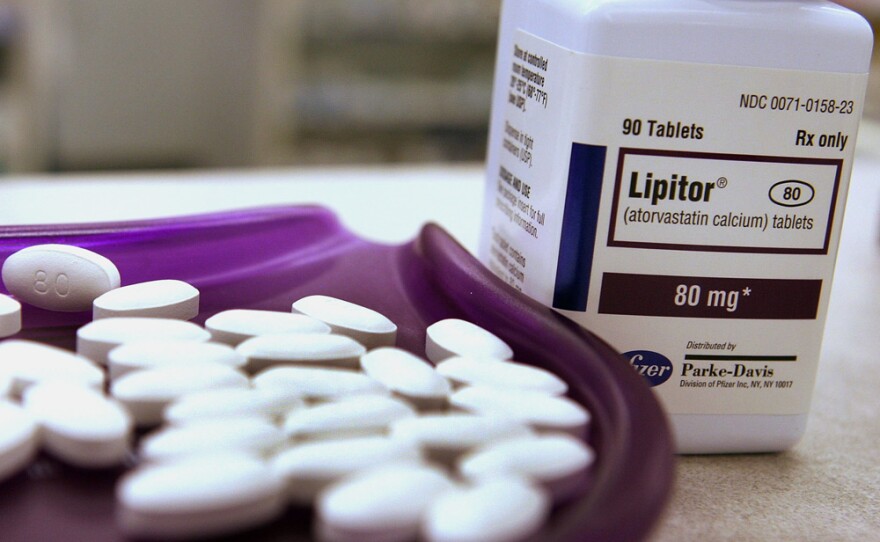When it comes to revamping health care, Senate Democrats are having trouble holding their caucus together. They're split on the public option, on abortion — and now, on prescription drug imports.
A proposed amendment to the overhaul bill would allow pharmacies and wholesalers to import lower-cost drugs.
President Obama supported such a measure when he was in the Senate, but Democratic leaders fear it could undermine an agreement that the White House and Democrats made with drugmakers to help keep down the overall cost of health care legislation.
Money Savings
Sen. Bernie Sanders, an independent from Vermont and self-described socialist, is normally opposed to what he calls "unfettered free trade." Yet Sanders is all for letting U.S. firms import prescription drugs such as the cholesterol-lowering statin Lipitor from countries where it sells at much lower prices.
"In Canada, it costs $33; France, $53; Germany, $48; Netherlands, $63; Spain, $32; the United Kingdom, $40; U.S.A., $125 — four times as much as it costs in Canada. Now, you explain that to me," says Sanders.
Sanders is one of many in the Senate Democratic caucus who, along with several Republicans, are backing the drug importation amendment sponsored by North Dakota Sen. Byron Dorgan.
The Congressional Budget Office has estimated there could be more than $100 billion in savings to U.S. prescription drug buyers over the next decade — $20 billion of which would be for the federal government — if cheaper prescription drugs from abroad were allowed to compete in the U.S. market.

Unresolved Safety Issues
But opponents question the safety of the drugs.
Food and Drug Administration Commissioner Margaret Hamburg wrote several senators saying she commends the efforts Dorgan has made to reduce risks associated with importing prescription drugs. Still, she concluded his measure has too many unresolved safety issues.
Dorgan insists those issues have been dealt with.
"We don't allow drugs to be imported from China or India, as a matter of this amendment — only FDA-approved drugs from FDA-inspected plants in Canada, the European countries, Japan, New Zealand or Australia. That's all. Why? Because they have an identical chain of custody to us, and that's the basis on which we determine how reimportation could work, and could work safely," he says.
But New Jersey Democratic Sen. Robert Menendez says it's a gamble the Senate "cannot afford to take."
"We shouldn't have to wonder what's in the bottle," he says.
New Jersey is home to several big drug manufacturers, and Menendez is leading the effort to block Dorgan's amendment.
"We are attacking the one last major research and manufacturing entity here in the United States," he says. "I don't want to offshore those jobs abroad, to allow contaminated and counterfeit prescription drugs to come into this country."
The Deal With PhRMA
Other Democrats consider Dorgan's amendment a threat to their health care bill because they fear it could blow up a deal with PhRMA, the powerful drug company lobbying group.
PhRMA agreed to absorb $80 billion in fees and discounts over the next decade to help bring down the cost of a health care bill that would bring PhRMA's members many new customers.
Arizona Republican Sen. John McCain says that's what really explains why the FDA opposes this measure.
"If the Dorgan amendment passes, then the agreement, the well-publicized agreement between PhRMA and the White House, is knocked out," he said. "And they are deeply concerned about the consequences of that."
Repeated attempts to force a vote on Dorgan's amendment have failed. Delaware Democratic Sen. Tom Carper, who opposes the measure, confirmed that it's being blocked.
"There are several holds on the amendment," he said. "And, uh, I'm not in a position to say who — I know who has at least three. But I don't know who has them all."
Even senators who've long supported importing cheaper drugs are torn over Dorgan's amendment, including the Senate's No. 2 Democrat, Dick Durbin of Illinois.
"Many of us support it, but wonder if this is the right venue," he said. "And it's become — there's a political subtext here that goes beyond the merits of the bill. And we don't want to slow down this bill or stop it."
The political subtext, Durbin added, is that keeping the money-saving deal with PhRMA intact may be a higher priority than risking that the drug import measure passes and scuttles that deal.
Copyright 2022 NPR. To see more, visit https://www.npr.org. 9(MDAzMjM2NDYzMDEyMzc1Njk5NjAxNzY3OQ001))







